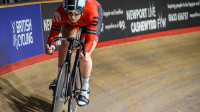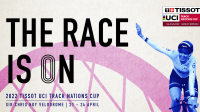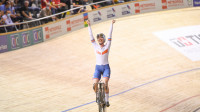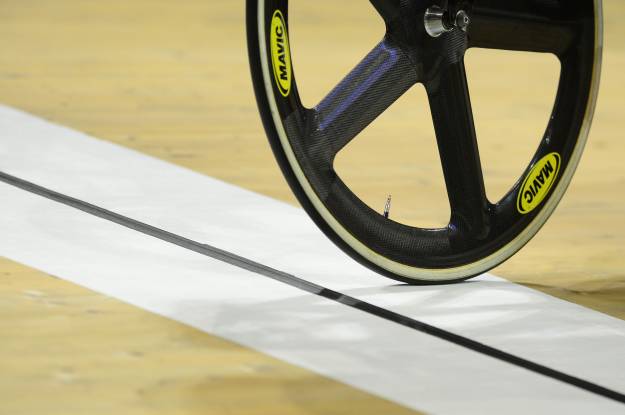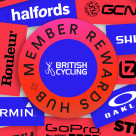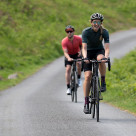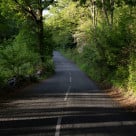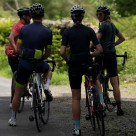The venue for the Olympic cycling events in 1948, the Herne Hill track – renovated, and silky smooth – is still crowning champions.
For the second year running, the South London velodrome was the setting for the BC National Derny Championships and, as the black tarmac soaked up the sun on the hottest day of the summer so far, it was clear that both of the title races would be decided by the riders who could squeeze as much speed as possible out of themselves without overheating.
Early on in the women’s race, it looked as though Corrine Hall (Node4 Giordana Racing) would take the honours as, with her pacer Derek Marloe, she rode away from the rest of the field and at one point was almost half a lap clear of her nearest rival, Hannah Walker (Matrix Fitness-Prendas), who was paced by George Gilbert.
As the race moved into the final third, however, the speed – and the heat - started to take its toll on Hall, and Walker began to pour on the pace. In the matter of a few laps she closed the gap, and once in front she never looked back, easing out a comfortable gap to secure back-to-back titles in the event.
Hall held on for silver medal with Joanne McRae (Look Mum No Hands) a distant but secure third behind Sean Bannister’s derny.
Last year’s men’s final saw several fancied riders over-geared and blow up in a fast-run race, but the heats on Saturday were different and more controlled – the second won, rather ominously, by Matt Gittings (AWcycles.co.uk) who, paced by Gilbert, simply sat at the back and cruised through the field in the closing laps.
Gittings had been the favourite for last year’s final which was rained off and rearranged for after he had returned to his cycling scholarship at Marian University in Indiana. This year he was determined to show what might have been and had prepared by winning the Reading Derny Fest, lapping the field.
In contrast to the heats, Gittings and Gilbert stormed to the front of the field in the final and began to claw out a lead. Within 10 laps they were starting to catch backmarkers and with 20 gone, there were only three other riders – last year’s silver-medallist Adam Duggleby (Sportscover Altura RT), Tom Murray (Team IG-Sigma Sport) and James Holland-Leader (Prestige VC) on the same lap.
The gap stayed stubbornly at half a lap until Holland-Leader blew, and although he regained pacer Graham Bristow’s wheel, he never regained contact with Duggleby and Murray. Then Murray started to fade as Gittings joined a group of lapped riders, one or two of whom – including Symon Lewis (Prestige VC), paced by his father Michael – used the opportunity to move back up to the pair fighting for second.
The story of the last third of the race was the battle between Duggleby, paced by Alex Wharton, and Gittings and Gilbert.
The gap yo-yoed between half a lap and a quarter of a lap with Duggleby never quite looking strong enough to challenge for the lead but, equally, not in danger of joining the rest of the field in being lapped.
With 12 to go Gittings appeared to be struggling to hold Gilbert’s wheel and the pace was easing off, but by this time Duggleby was breathing through his ears and four laps from the end, suitably rested, Gittings and Gilbert ramped up the pace and closed down the gap to pass Duggleby and Wharton on the line at the bell, opening up a 50-metre gap by the finish.
Gittings had the national champion’s jersey to take back to the US the following week, and Duggleby had another silver medal. Murray was originally told he had third place but, after a lengthy review of all the passing and re-passing in the midfield in the final laps, the bronze medal was awarded to the Lewis son-and-father duo.
Results
Men
1. Matt Gittings (AWcycles.co.uk) / George Gilbert
2. Adam Duggleby (Sportscover Altura RT) / Alex Wharton
3. Symon Lewis (Prestige VC) / Michael Lewis
Women
1. Hannah Walker (Matrix Fitness-Prendas) / George Gilbert
2. Corrine Hall (Node4 Giordana Racing) / Derek Marloe
3. Joanne McRae (Look Mum No Hands) / Sean Bannister
British Cycling would like to thank the organising team, officials and everyone else who helped promote this event. Our sport could not exist without the hundreds of people, many of them unpaid volunteers, who put in many hours of hard work running events, activities and clubs.

